14 Food Recalls That Will Always Haunt Whole Foods
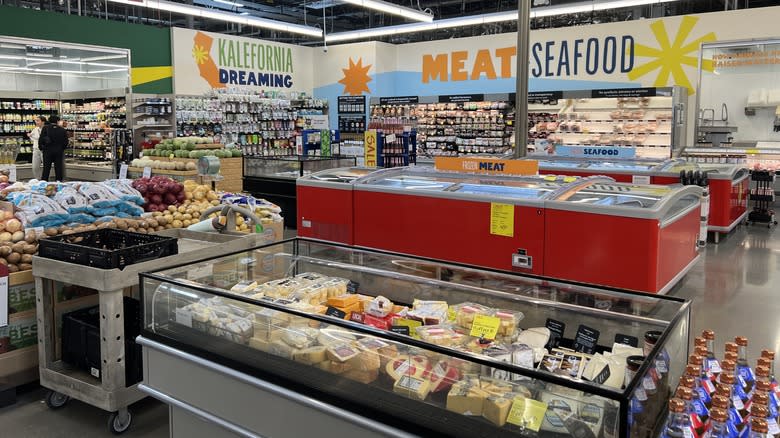
During 2023, food recalls from major grocery store brands such as Whole Foods reached a post-pandemic high. This was not only alarming for those at risk of consuming these products, but also the grocery store brands that sell them. Despite not being responsible for the manufacturing of foods, companies like Whole Foods often bear the brunt of the public's anger when recalls are issued. This is especially true when the recalled food has made people ill or significantly inconvenienced them.
According to a report by the U.S. Public Interest Research Group Education Fund, over 300 food products were recalled throughout 2023. The majority of these recalls were due to foods containing undeclared allergens. This is an enduring issue for Whole Foods; in fact, the grocery store once got a warning letter from the Food and Drug Administration for receiving and selling misbranded food products that contained undeclared allergens with alarming regularity. The second most common cause of food recalls during 2023 was contamination by Listeria monocytogenes, a bacteria which has dogged Whole Foods dairy products, specifically cheese, for years. Unfortunately, Whole Foods does not seem to have learned from either the warning letter or its past mistakes over the years. Here, we examine 14 recalls that have had the largest impact on the chain, turning customers against Whole Foods and potentially haunting the brand forever.
Read more: The 6 Best And 6 Worst Grocery Stores To Buy Produce From
Chocolate Bar Recalled Due To Undeclared Hazelnuts
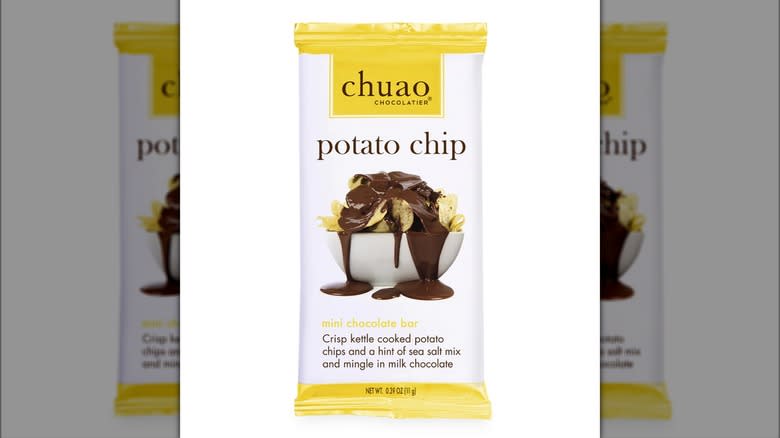
Accurate, clear allergen information is an absolute must for all food products. This is especially true when it comes to products that contain tree nuts, as these are known to contain multiple different allergens. Unfortunately, items sold at Whole Foods don't always have accurate allergen information, as is exemplified by a single lot of Chuao Chocolatier's potato chip-laden chocolate bar.
According to the Food and Drug Administration, Chuao Chocolatier issued a recall for these mini chocolate bars in May 2024 after it was discovered that hazelnuts had been erroneously added to them. It was reported that this was due to cross-contamination. As this was an accident, the product's allergen information was not updated, resulting in the hazelnut-containing chocolate reaching the market without hazelnuts being added to the label as an allergen. To make matters worse, the chocolate bar was distributed nationwide by several retailers, including Whole Foods.
Whole Foods and other grocery store brands executed a prompt recall. Despite the chocolate bar being available in every state apart from Hawaii and Alaska, only one person fell ill as a result of the undeclared hazelnuts. What's more, the allergic reaction this person suffered was deemed to be mild, a lucky escape for all parties involved.
Blueberries Recalled Due To High Levels Of Lead

In July 2022, the Food and Drug Administration announced that freeze-dried blueberries sold under the Natierra brand were being recalled by several grocery store brands including Sprouts and Whole Foods. The recall was first issued by Natierra's parent company BrandStorm Inc. after it was discovered the blueberries contained more than the Food and Drug Administration's recommended level of lead.
This was a particularly alarming food recall. High lead levels can lead to lead poisoning which causes serious damage to much of the human body -- although it often shows no symptoms. Lead poisoning can also have a hugely detrimental effect on children. As such, Whole Foods and other affected retailers worked quickly to remove the blueberries from shelves.
As of this writing, no instances of lead poisoning have been reported due to the blueberries. However, one lot of the frozen blueberries had a best-before date of January 2025, suggesting that some customers might still have, and be unwittingly consuming, the affected product.
Walnuts Recalled After E. Coli Outbreak
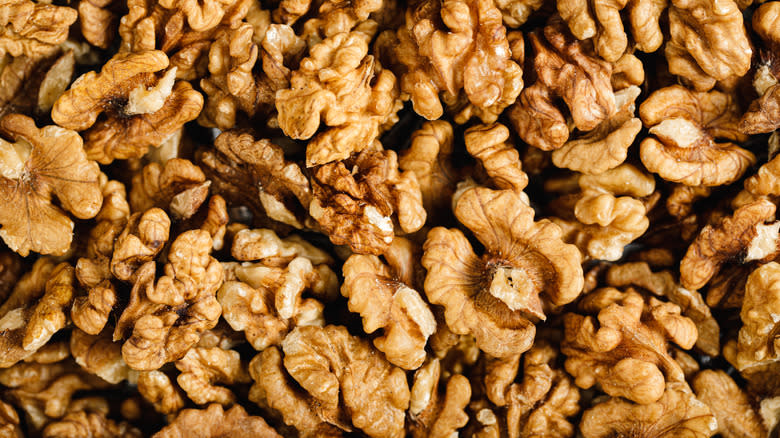
Whole Foods is widely known for its excellent salad bar. Unfortunately, the food served there is just as likely to be recalled as the products that line the chain's shelves. This was highlighted in April 2024 when the Food and Drug Administration announced that Gibson Farms was issuing a recall of its shelled walnuts. This recall was issued after the walnuts were identified as the source of an E. coli outbreak that made at least 12 people sick and resulted in seven hospitalizations.
Over 300 retailers issued a recall of the walnuts, including 10 Whole Foods stores. At these locations, the walnuts were exclusively used in the brand's salad bar offerings. Once the recall was issued, Whole Foods removed all of the affected walnuts. It is not known if the Whole Food salads were responsible for any of the E. coli illnesses or hospitalizations.
This particular outbreak was caused by the E. coli strain O157:H7, which can be destroyed by heating food to 158 degrees Fahrenheit or above. While easily achievable for cooked food, products that are often eaten raw, such as walnuts, are unlikely to reach this temperature. This is what makes foods like walnuts such a dangerous carrier of E. coli bacteria.
Battered Fish Recalled Over Undeclared Allergen
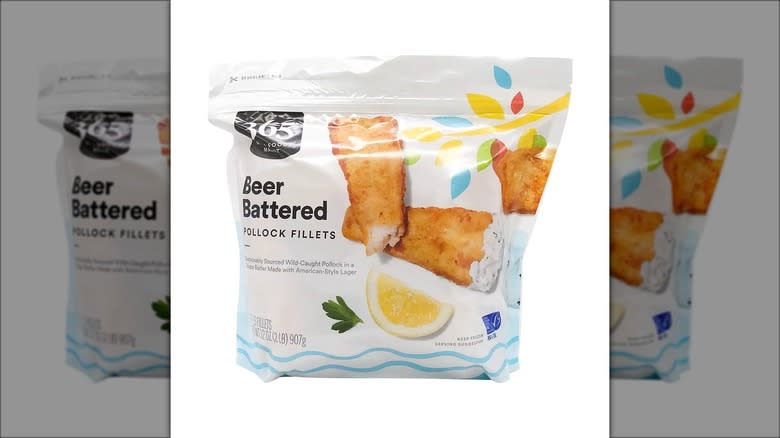
Another instance of Whole Foods inadvertently selling a product with an undisclosed allergen came in December 2023 when, according to the Food and Drug Administration, two 365 Whole Foods Market beer battered fish products were found to contain undeclared soy. This is an allergen that, in extreme cases, can cause anaphylaxis and even death, so clear labeling is a must. Both products -- Beer Battered Pollock Fillets and Beer Battered Cod Fillets -- were produced by Tampa Bay Fisheries Inc. and were only available at Whole Foods stores.
Thankfully, no illnesses or allergic reactions were reported as a result of people eating the soy-laced fish products. That being said, this recall was further proof that Whole Foods failed to tackle its issues with selling items containing undeclared allergens, even after receiving a warning letter from the Food and Drug Administration. In that sense, this food recall had a damaging effect on Whole Foods, despite the impact of the mislabeled food being minimal.
Various Cheeses Recalled Due To Listeria Outbreak

Listeria monocytogenes is a bacteria that, if ingested, can lead to an illness known as listeriosis. While most people will recover from listeriosis without medical attention, vulnerable adults, children, and pregnant people are at an increased risk of becoming seriously ill. It's for this reason that Whole Foods quickly recalled a variety of soft wash-rind raw milk cheeses from nine of its stores when supplier Vulto Creamery indicated they might be the source of a Listeria outbreak. As per the Food and Drug Administration, this recall was executed during February 2018.
It was confirmed that the Listeria outbreak associated with these cheeses resulted in six hospitalizations and two deaths. Because Vulto Creamery also supplied a variety of specialty cheese stores with its soft wash-rind milk cheeses, it is not known exactly where and from which company the cheese which caused these illnesses and deaths was sold. It was noted, though, that Whole Foods did not receive any reports of illness from customers who bought Vulto Creamery products from its stores.
Soup Recalled Due To Mislabeling
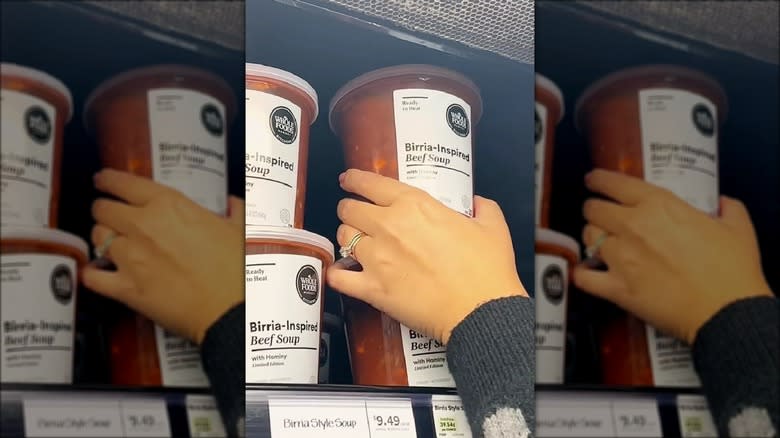
While most cases of mislabeling involve an ingredient or two being left off the label, in some instances, the product and label are at complete odds with one another. This was the case at certain Whole Foods stores during 2023. An announcement made by the Food Safety and Inspection Service in December 2023 first alerted the public that a container which was supposed to contain a birria-inspired beef soup had actually been filled with plant-based chicken noodle soup. Aside from being a completely different product, this mislabeling posed a serious health risk, as the chicken noodle soup contained sesame, an allergen, which the birra beef soup did not.
This product was made and packaged for various Whole Foods locations and was recalled from stores in Arizona, California, Hawaii, Idaho, Montana, Nevada, Oregon, and Washington. While no illnesses or allergic reactions were linked to this labeling error, it was another embarrassing recall for Whole Foods.
Ice Cream Recalled Due To Listeria Contamination
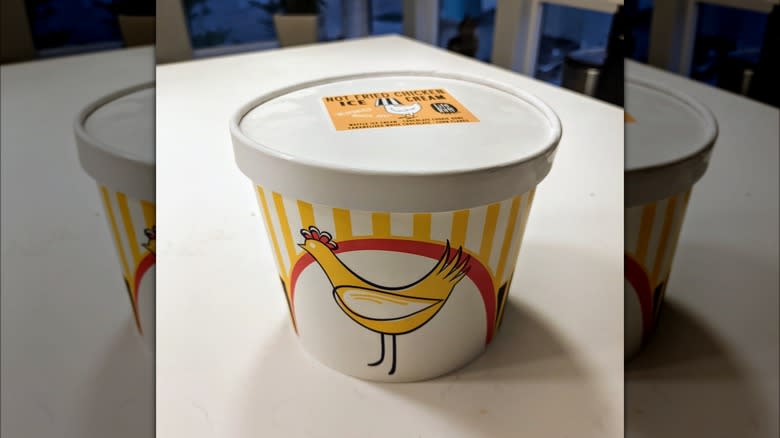
During early September 2023, Life Raft Treats, a company that became famous for its unique fried chicken ice cream and other sweet treats, announced a recall of three of its products: the Not Fried Chicken 64 ounce ice cream bucket, the Not Fried Chicken 2.5 ounce ice cream bar, and the Life Is Peachy 6 count ice cream box. The Food and Drug Administration subsequently shared the recall announcement. All three products were recalled due to concerns they had been contaminated with Listeria monocytogenes bacteria.
As certain Whole Foods stores stocked Life Raft Treats' products, the grocery store brand also shared news of the recall, focusing on Life Raft Treats' Not Fried Chicken products. During testing, these products were the ones that were found to be contaminated by Listeria monocytogenes. The Life Is Peachy product recall was issued because it was made in the same room as the Not Fried Chicken products.
Despite Life Raft Treats' products being in great demand, both in Whole Foods and online, no illnesses were reported in association with the three ice cream products. This was a fortunate escape for both Life Raft Treats and Whole Foods.
Ice Cream Recalled Due To Undeclared Allergen
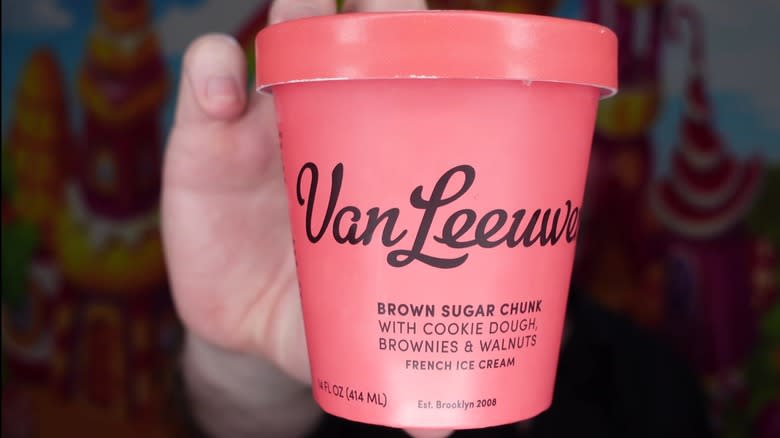
In May 2023, the Food and Drug Administration shared the news that Van Leeuwen was recalling over 4,000 pints of Brown Sugar Chunk ice cream from retailers across the United States, including Whole Foods. The ice cream was recalled because it contained walnuts, an allergen that was not declared on the product's packaging. In a press release, Van Leeuwen said it was investigating a product labeling error, suggesting that the inclusion of walnuts was not due to a manufacturing mishap.
This recall marked the grocery store brand's ninth recall over a six month period. To Whole Foods' credit, stores swiftly removed the item from freezers and encouraged customers who'd bought the ice cream to either return it or dispose of it. This response undoubtedly contributed to no serious reactions or illnesses being associated with the ice cream.
Canned Baby Clams Recalled Due To High Chemical Levels
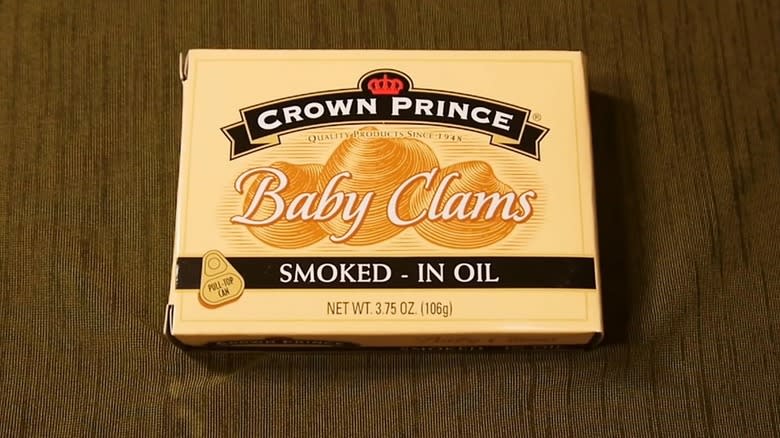
While all food recalls are concerning, those that are issued due to high chemical levels are particularly alarming. It's no surprise, then, that many Whole Foods customers were upset when, in July 2022, the Food and Drug Administration announced that cans of Crown Prince smoked baby clams, sold nationwide by retailers including Whole Foods, contained detectable levels of per- and polyfluoroalkyl chemicals.
An experiment conducted by the FDA found that the smoked baby clams contained just under 20,000 parts per trillion of per- and polyfluoroalkyl chemicals. This is far above the 4 parts per trillion the Environmental Protection Agency set as the maximum acceptable amount when analyzing drinking water. The recall was issued and promptly enforced after this discovery was made. Retailers, including Whole Foods, consequently pulled the canned baby clams from their shelves.
Ingesting per- and polyfluoroalkyl chemicals has been linked with numerous health issues including thyroid problems and a number of cancers. The severity of these illnesses made this recall particularly unnerving for both Whole Foods and anyone who'd purchased the product elsewhere.
Ricotta Recalled Over Listeria Concerns

One of the longest Listeria monocytogenes outbreaks in recent memory lasted from June 2014 to December 2023. Food supplied by Rizo-López was eventually discovered to be the source. As a supplier to many large grocery store brands, Rizo-López's outbreak had significant reach, affecting people in 11 states. According to an investigation by the Centers for Disease Control and Prevention, 26 people fell ill, 23 were hospitalized, and two died as a result of eating contaminated food.
Rizo-López recalled a huge number of products in February 2024. This recall included two ricotta products that were sold by Whole Foods. Due to the widespread nature of the outbreak and the large number of retailers involved, it is not known which specific products resulted in these illnesses, hospitalizations, and deaths. Regardless, the fatal nature of the outbreak made this a tragic recall for all parties involved, Whole Foods included.
Dumplings Recalled Due To Lack Of Inspection
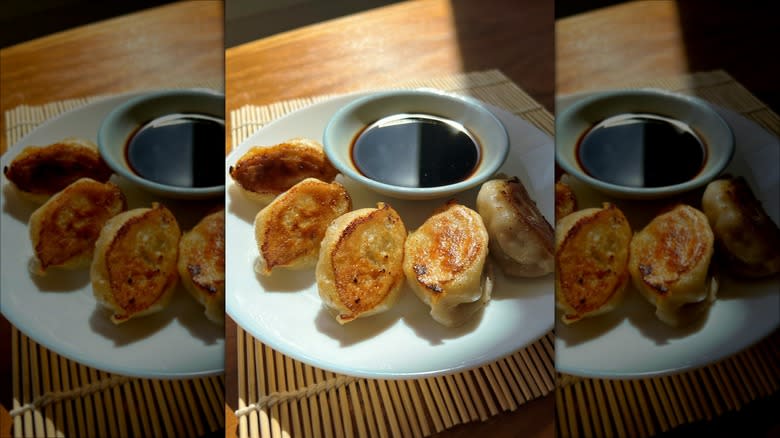
In July 2023, the Food Safety and Inspection Service announced that three products from Mulan Dumpling had been produced in a factory that did not have a federal grant of inspection. These products were Mulan Dumpling's Pork & Cabbage Dumplings, Curry Seasoned Chicken Dumplings, and Shrimp & Chives Dumplings, which contained pork.
The initial recall focused on 1,560 pounds of the three dumpling products. This was later expanded to include 22,874 pounds of the products sold by a variety of nationwide retailers, including one Whole Foods store located in Missouri. Of this amount, only slightly more than 3,000 pounds was actually recovered.
No ill effects were reported in association with the three dumpling products. But this recall once again brought into question the grocery store's ability to source safe, quality food.
Cookies Recalled Over Undeclared Allergen
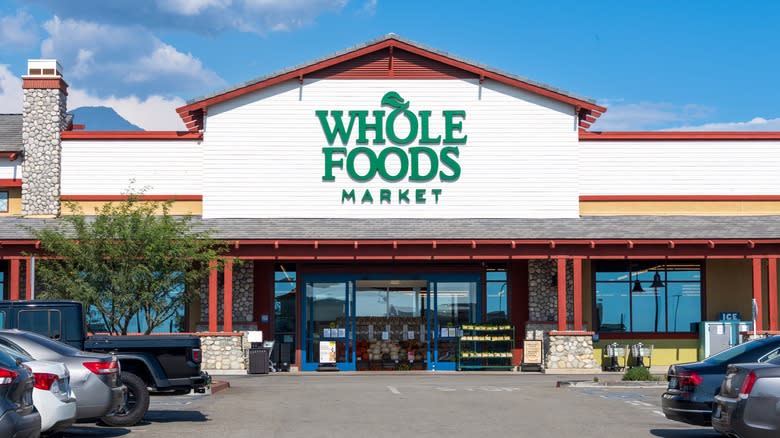
In April 2017, the Food and Drug Administration revealed that nine Whole Foods stores located in Northern California had sold iced cookies in a self-service display without alerting customers that they contained eggs. Egg allergies have the potential to be just as serious as tree nut allergies, and can cause nausea, vomiting, and even anaphylaxis. To make matters worse, these allergies are quite prevalent in children. Thankfully, no illnesses or allergic reactions were reported as a result of people eating the cookies.
The vast majority of recalls included in this article were due to a mistake made by one of Whole Foods' suppliers. In this instance, however, the recall was due to an error made by Whole Foods itself. This makes this recall uniquely damaging to the grocery store brand's reputation, even though it did not cause any physical harm to Whole Foods' clientele.
Cheese Recalled Due To Listeria Contamination

Most people don't know everything there is to know about the Whole Foods cheese section. But what you might be piecing together as you read this article is that Whole Foods has stocked several cheeses contaminated with Listeria monocytogenes over the years. In September 2022, this happened again. Old Europe Cheese issued a recall for all its brie and camembert products. The Food and Drug Administration promptly shared news of the recall, revealing that it involved retailers across both the United States and Mexico, including 10 Whole Foods stores.
After an investigation, it was revealed that the Listeria monocytogenes strain associated with Old Europe Cheese's products had been behind six cases of listeriosis that were reported from 2017 to 2022. Five of these individuals required hospitalization. It is not known which Old Europe Cheese's product caused the illnesses and hospitalizations, or from which grocery store brand they were bought. Nevertheless, this recall proved a damaging blow to Whole Foods' reputation, as it was yet another instance of the brand selling contaminated cheese.
Salmon Burgers Recalled Over Undeclared Allergen
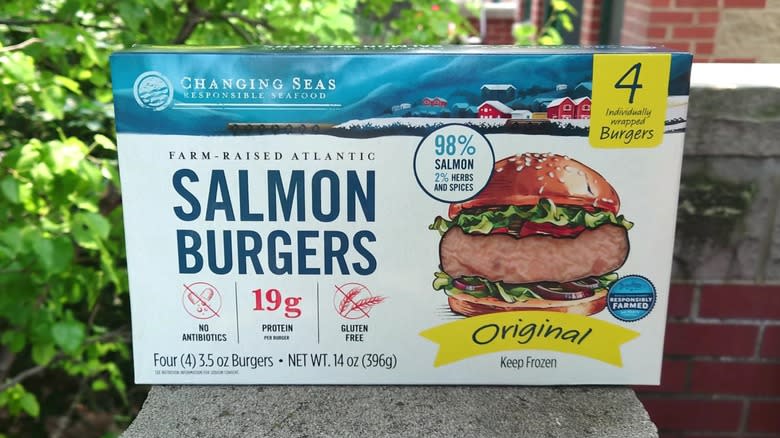
In November 2023, the Food and Drug Administration shared that Raw Seafoods Inc. was recalling its salmon burgers. These burgers were exclusively sold in Whole Foods stores and had been found to contain not one, but two undeclared allergens: sesame and milk.
Food companies have been required to list sesame as an allergen since January 2023. As with many other allergies, the usual symptoms are mild. However, in some circumstances, ingesting sesame can lead to serious symptoms including anaphylaxis. The same can be said for milk, highlighting how serious this food recall was. Thankfully, no illnesses or allergic reactions were reported in association with the salmon burgers. But milk and sesame allergy sufferers won't forget this incident any time soon.
Read the original article on The Daily Meal.

 Yahoo News
Yahoo News 
